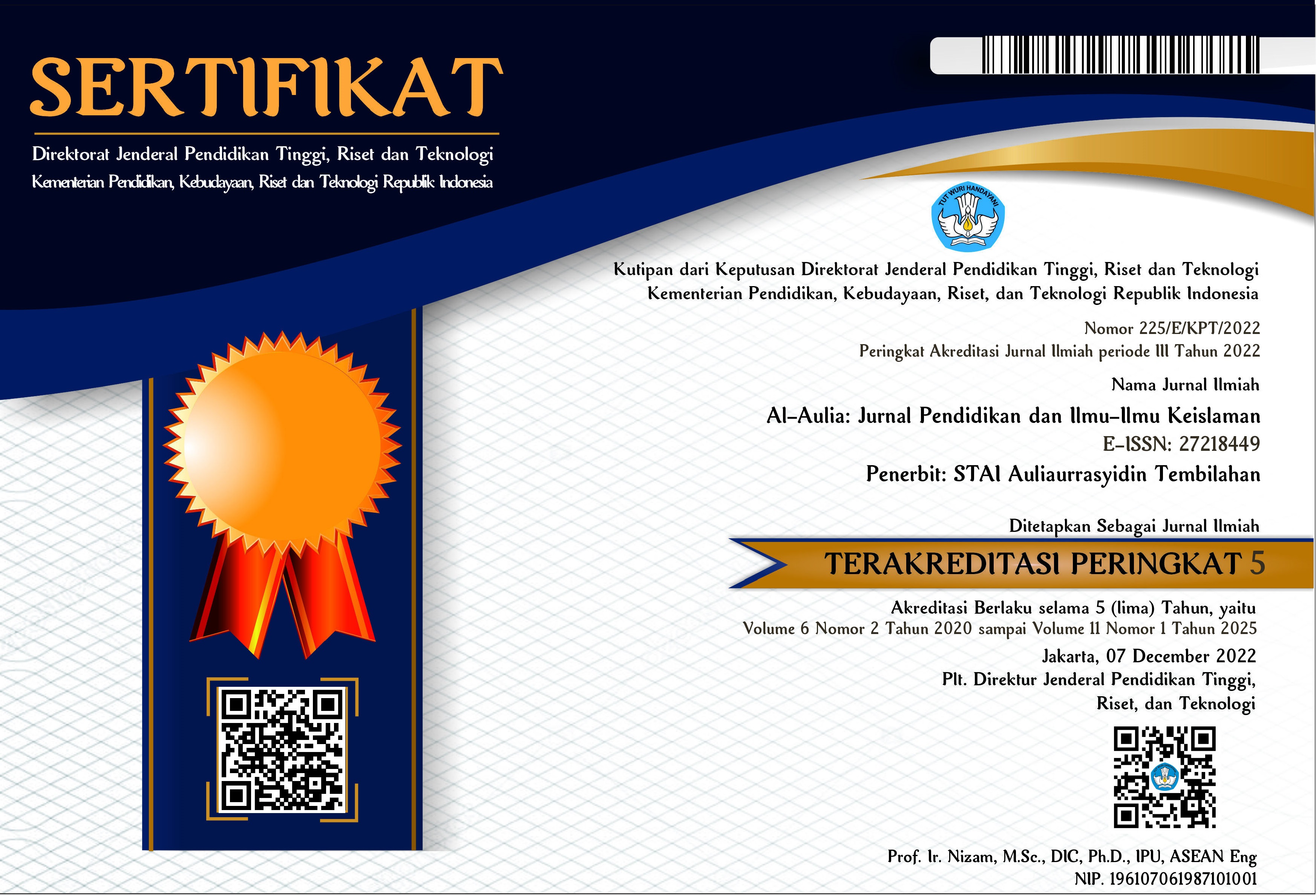Ilmu dalam Tinjauan Filsafat: Ontologi, Epistemologi, dan Aksiologi
DOI:
https://doi.org/10.46963/aulia.v10i1.1875Keywords:
Philosophy of Science, Ontology, Epistemology, AxiologyAbstract
Science has specific components, such as objects, statements, propositions, and characteristics. These four aspects are the focus of three philosophical foundations: ontology, epistemology, and axiology. This article is written to discuss science from a philosophical perspective, namely ontology, epistemology, and axiology. In this article, the author uses the literature study method by reviewing various books and other scholarly works relevant to the topic discussed. From the analysis, it can be concluded that ontology focuses on the nature of "being." In ontological studies, science aims to prove and examine the existence of a particular knowledge. Epistemology addresses the foundation of knowledge, including its sources, characteristics, truth, and methods of acquisition. From the epistemological perspective, the discussion of science centers on the sources and methods used by scientists to develop knowledge. Axiology deals with the relationship between science and values, evaluating the appropriateness of developing certain knowledge based on existing values.
References
Adib, M. (2011). Filsafat Ilmu Ontologi, Epistemologi, Aksiologi, dan Logika Ilmu Pengetahuan. Pustaka Pelajar.
Adib, M. (2014). Filsafat Ilmu. Pustaka Pelajar.
Arifandy, M. (2018). Perbandingan epistimologi sebagai sumber ilmu pengetahuan menurut islam dan barat. ResearchGate.
Arwani, A. (2012). Epistemologi hukum ekonomi islam (muamalah). Religia: Jurnal Ilmu-Ilmu Keislaman, 15(1), 125–146.
Hamied, F. A., Komar, O., & Kurniawan, E. (2018). Filsafat Ilmu: Rujukan bagi Para Calon Cendekiawan. UPI Press.
Hasan, J. (2023). AKSIOLOGI ILMU PENGETAHUAN (Telaah Tentang Manfaat Ilmu Pengetahuan dalam Konteks Ilmu Dakwah). Jurnal Al-Idarah: Jurnal Manajemen Dan Administrasi Islam, Vol 3, No 1 (2019), ISSN: 2549-4961 (Print), E-ISSN: 2549-6522.
Jalaluddin. (2013). Filsafat Ilmu Pengetahuan. Rajawali Pers.
Khomsatun, N. (2019). Pendidikan Islam dalam Tinjauan Ontologi, Epistemologi, dan Aksiologi. Educreative: Jurnal Pendidikan Kreativitas Anak, 4(2), 137–226.
Luthfiyah, L., & Khobir, A. (2023). Ontologi, Epistimologi dan Aksiologi Filsafat Pendidikan. Jurnal Basicedu, 7(5).
Mahfud, M. (2018). Mengenal Ontologi, Epistemologi, Aksiologi Dalam Pendidikan Islam. CENDEKIA: Jurnal Studi Keislaman, 4(1).
Natasya, A., Putri, T., Siahaan, R. P. J., & Khoirunnisa, A. (2022). Filsafat ilmu dan pengembangan metode ilmiah. Mahaguru: Jurnal Pendidikan Guru Sekolah Dasar, 3(1).
Rahayu, N. A. P. (2021). Tinjauan ontologi, epistemologi, dan aksiologi peningkatan ketereampilan menulis deskripsi melalui model kooperatif tipe round table. Jurnal Pendidikan Bahasa Dan Sastra Indonesia Undiksha, 11(1).
Rahmasari, N. V. D., & Zuchdi, D. (2021). Tinjauan Ontologi, Epistemologi, dan Aksiologi Materi Sastra dalam Buku Teks Bahasa Indonesia Kelas VIII. Jurnal Filsafat Indonesia, 4(1).
Rochmawat, I. (2017). Pendidikan karakter dalam kajian filsafat nilai. Jurnal Annaba’STIT Muhammadiyah Paciran, 3(1).
Rosnawati, R., Syukri, A. S. A., Badarussyamsi, B., & Rizki, A. F. R. A. F. (2021). Aksiologi Ilmu Pengetahuan dan Manfaatnya bagi Manusia. Jurnal Filsafat Indonesia, 4(2).
Saefuddin, D. (1998). Desekularisasi Pemikiran: Landasan Islamisasi. Mizan.
Salahudin, A. (2021). Filsafat Ilmu: Menelusuri Jejak Integrasi Filsafat, Sains, dan Sufisme-Rajawali Pers. PT. RajaGrafindo Persada.
Sanprayogi, M., & Chaer, M. T. (2017). Aksiologi Filsafat Ilmu dalam Pengembangan Keilmuan. AL-MURABBI: Jurnal Studi Kependidikan Dan Keislaman, 4(1), 105–120.
Suriasumantri, J. S. (2009). Filsafat Ilmu: Sebuah Pengantar Populer. Pustaka Sinar Harapan.
Susanto., A. (2011). Filsafat Ilmu: Suatu Kajian dalam Dimensi Ontologis, Epistemologis dan Aksiologis. Bumi Aksara.
Utama, I. G. B. R. (2021). Filsafat Ilmu dan Logika Manajemen dan Pariwisata. Deepublish.
Downloads
Published
Issue
Section
License
Copyright (c) 2024 Al Munip

This work is licensed under a Creative Commons Attribution-ShareAlike 4.0 International License.
Authors who publish with this journal agree to the following terms:
1. Copyright on any article is retained by the author(s).
2. The author grants the journal, right of first publication with the work simultaneously licensed under a Creative Commons Attribution License that allows others to share the work with an acknowledgment of the work’s authorship and initial publication in this journal.
3. Authors are able to enter into separate, additional contractual arrangements for the non-exclusive distribution of the journal’s published version of the work (e.g., post it to an institutional repository or publish it in a book), with an acknowledgment of its initial publication in this journal.
4. Authors are permitted and encouraged to post their work online (e.g., in institutional repositories or on their website) prior to and during the submission process, as it can lead to productive exchanges, as well as earlier and greater citation of published work.
5. The article and any associated published material is distributed under the Creative Commons Attribution-ShareAlike 4.0 International License







